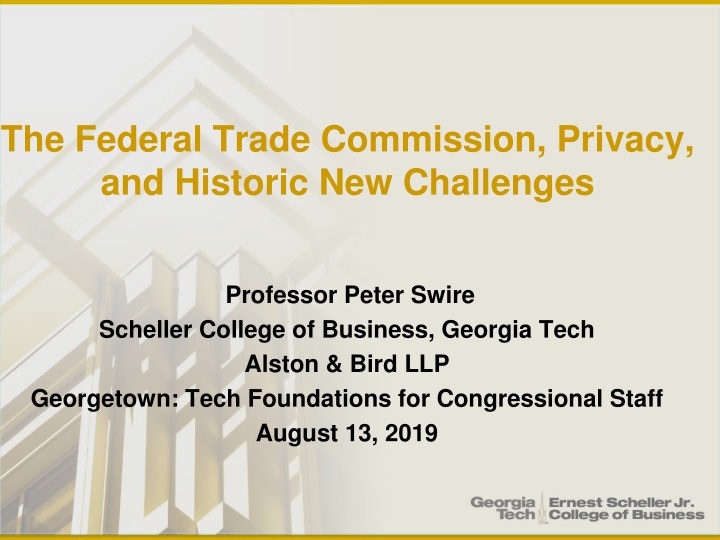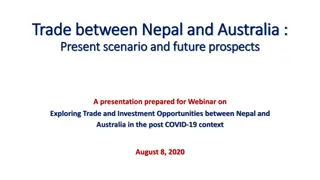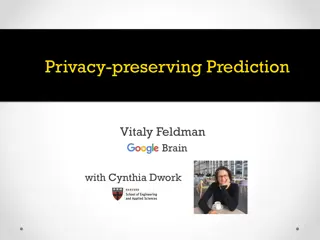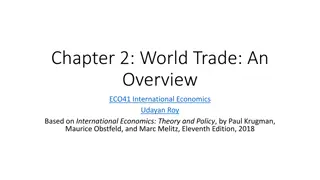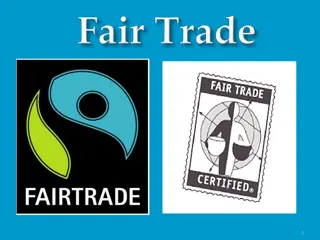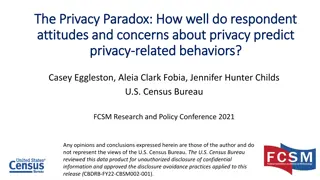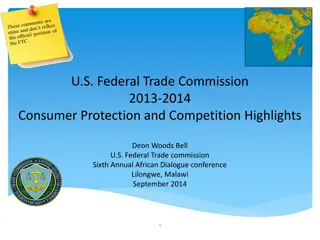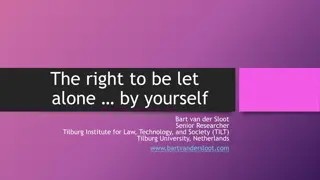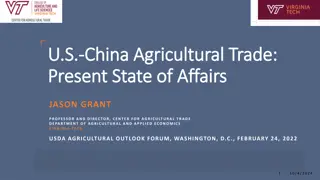Federal Trade Commission Privacy Challenges Today
Federal Trade Commission's role as a global leader in privacy, historic background of Professor Peter Swire, challenges faced by FTC, and proposed changes in privacy laws. The overview includes Swire's current background at Georgia Tech and his involvement in privacy and cybersecurity over the years.
Download Presentation

Please find below an Image/Link to download the presentation.
The content on the website is provided AS IS for your information and personal use only. It may not be sold, licensed, or shared on other websites without obtaining consent from the author.If you encounter any issues during the download, it is possible that the publisher has removed the file from their server.
You are allowed to download the files provided on this website for personal or commercial use, subject to the condition that they are used lawfully. All files are the property of their respective owners.
The content on the website is provided AS IS for your information and personal use only. It may not be sold, licensed, or shared on other websites without obtaining consent from the author.
E N D
Presentation Transcript
The Federal Trade Commission, Privacy, and Historic New Challenges Professor Peter Swire Scheller College of Business, Georgia Tech Alston & Bird LLP Georgetown: Tech Foundations for Congressional Staff August 13, 2019
Overview Swire background FTC as early global leader on privacy FTC role as innovator and regulator is greatly diminished today The status quo is unsatisfactory, so consider what changes to seek
Swire Background Now: Georgia Tech: Scheller College of Business, courtesy appointments in College of Computing & Public Policy Teach privacy and cybersecurity Senior Counsel, Alston & Bird LLC Privacy since mid-90 s Brookings book on EU/US privacy in 1998 Clinton Administration Chief Counselor for Privacy, in OMB, 1999-2001 First person to have government-wide privacy responsibility HIPAA, GLBA, FTC, encryption, cybersecurity
Swire (2) Since 2007, lead author on standard textbook to be certified as a US privacy professional 2013: post - Snowden, Review Group on Intelligence and Communications Technologies Led to USA Freedom Act and multiple NSA/surveillance reforms Currently, lead Cross-Border Data Forum government access requests across borders while preserving privacy Congress addressed these issues in the Cloud Act of 2018 Next, how to implement it, in U.S. and globally www.crossborderdataforum.org
1998 Privacy Laws Proposed Comprehensive Sectoral None
2018 Privacy Laws Proposed Comprehensive Sectoral None
FTC as Early Global Leader on Privacy Fair Credit Reporting Act 1970 Section 5 unfair and deceptive power since late 90 s Deception enforcement for broken privacy promise Unfairness enforcement when bad security leads to substantial harms to consumers COPPA 1998 CAN-SPAM 2003 Bully pulpit => Privacy notices De-identification Others, as shown in reports and workshops
FTC No Longer the Leading Source for New Privacy Consumer Protections Over 120 countries now with privacy laws GDPR global companies must comply CCPA more spending on state compliance than federal FTC resource constraints Staffing roughly level (or down) since 2000 Has more happened on the Internet? Deception power less effective Companies used to break privacy promises; now they don t over-promise in their privacy notices Unfairness power less effective Companies don t always agree to consent decrees any more Wyndham and Lab MD mean that new enforcement may facer challenges in the courts
More Consumer Issues Facing FTC Since 1990 s, big FTC Internet issues were privacy and cybersecurity Other big issues now: Competition the techlash Content moderation when to take down content? Proposals to cut back on intermediary immunity under Section 230 Re-identification may be so pervasive that de- identified business practices will change That would greatly change online advertising AI/Machine Learning algorithmic transparency and risk of discrimination
Conclusion, and Introduction to Discussion The tendency in DC and Congress is to assume that the status quo is roughly correct Or, at least, that the status quo is hard to change FTC faces such large challenges that the status quo is suspect Section 5 unfairness and deception will be less effective Resources are so constrained The number and technical complexity of the issues are far more challenging Consider proposals for FTC change in this context of a thoroughly unsatisfactory status quo
Possible Discussion Topics on FTC Civil monetary penalties APA Rulemaking authority Scope of FTC jurisdiction Non-profits Common carriers Antitrust intersection Preemption Deception power Unfairness power FTC resources FTC technologists Independent litigating authority
